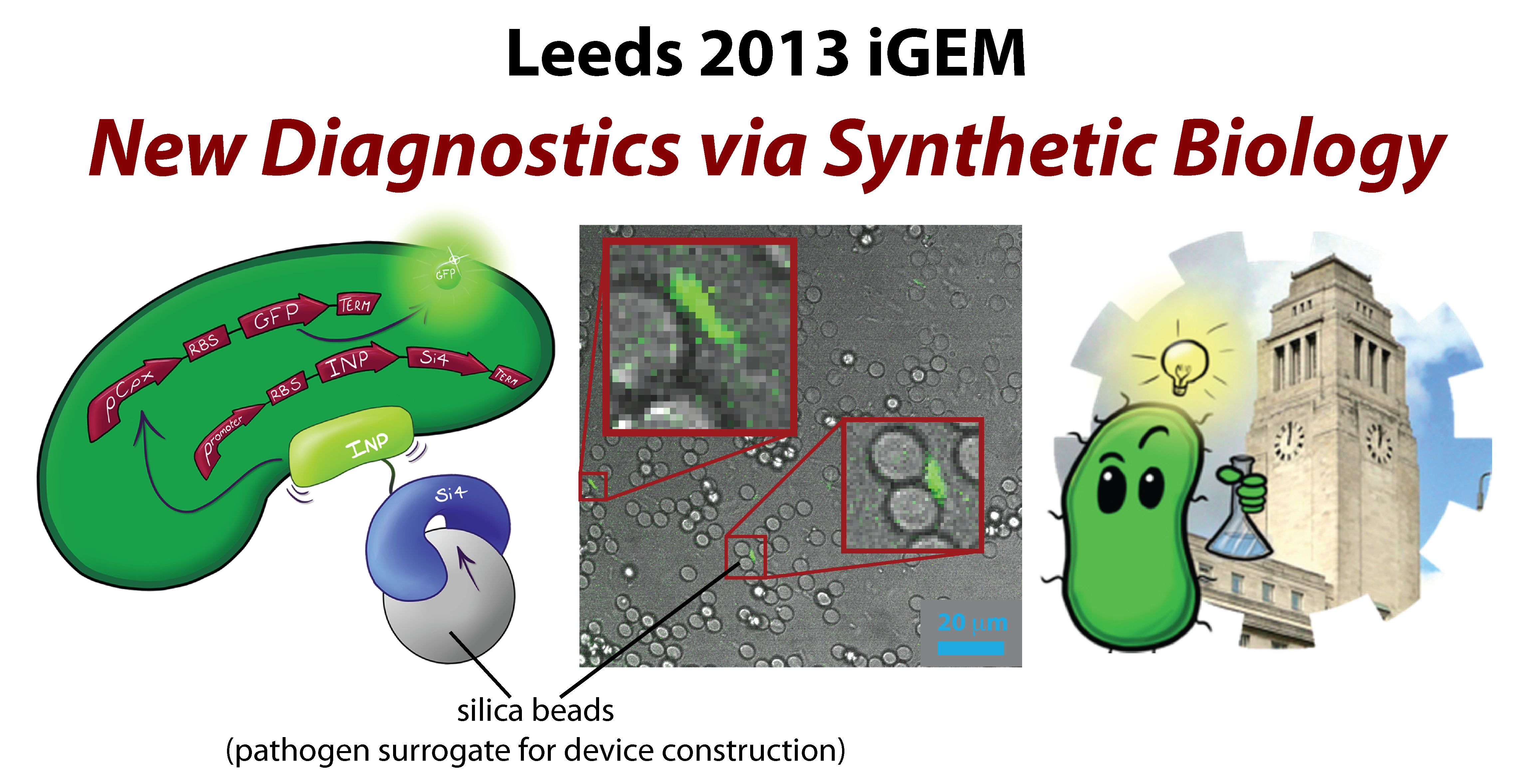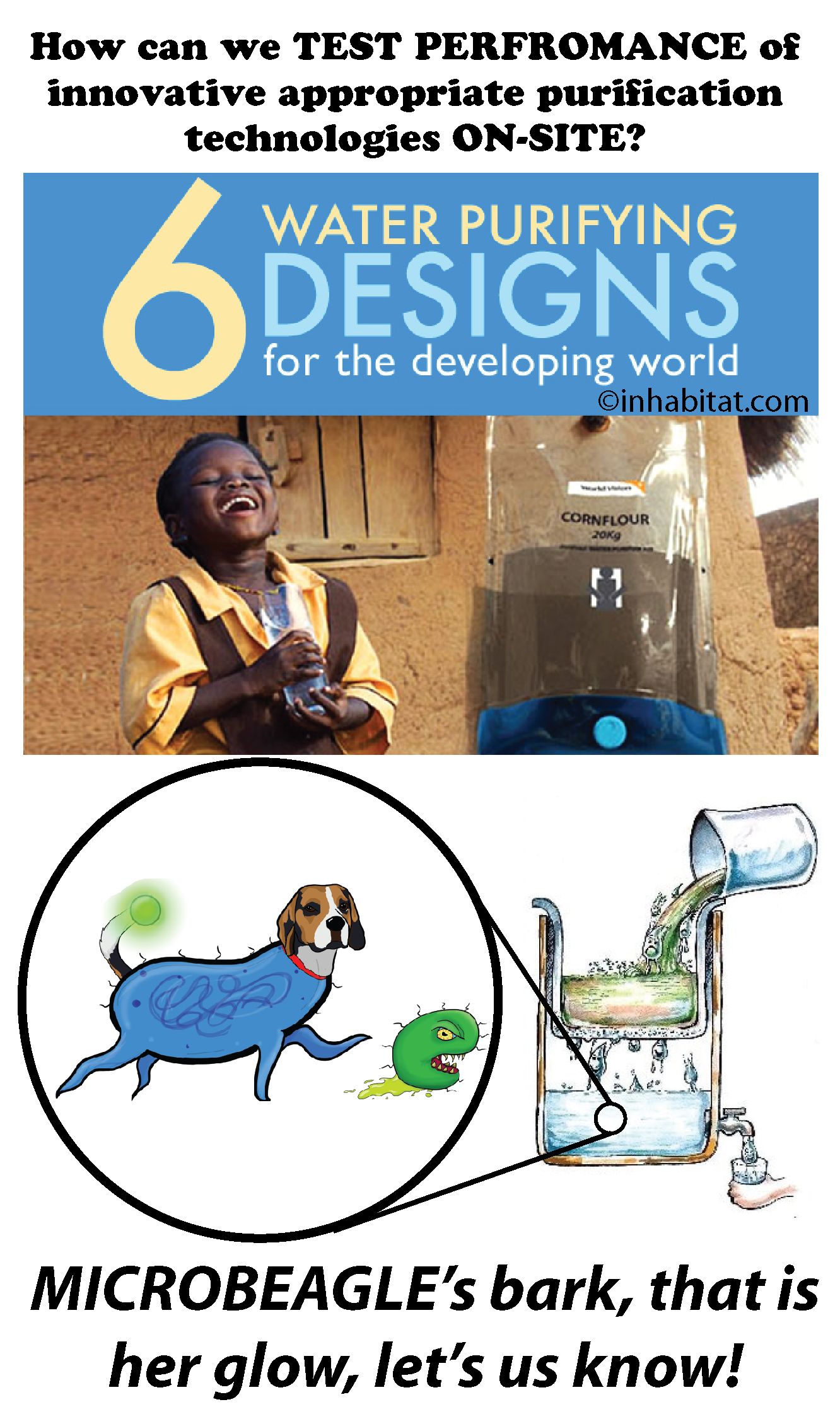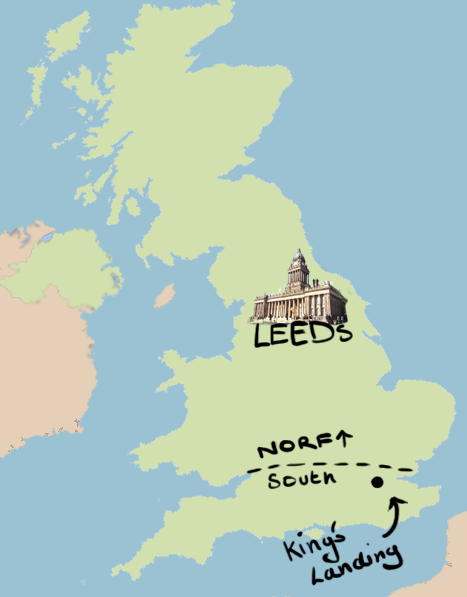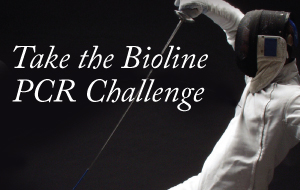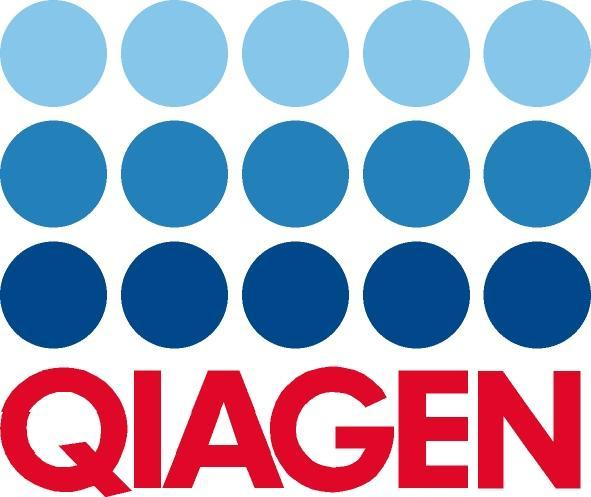Team:Leeds
From 2013.igem.org
(Difference between revisions)
m |
|||
| (20 intermediate revisions not shown) | |||
| Line 7: | Line 7: | ||
</html> | </html> | ||
__NOTOC__ | __NOTOC__ | ||
| - | {{Team:Leeds_layout|HeaderImage=|Header=Welcome to the Leeds Wiki!|content= | + | {{Team:Leeds_layout|HeaderParky=</div>[[File:Leeds_ParkyPanoram.png|150px|link=|frameless]]<div>|HeaderImage=[[File:Leeds_HomepageHead.png|825px|link=|frameless]]|Header=Welcome to the Leeds Wiki!|content= |
| - | [[File:Leeds sooperheader3.png|center| | + | [[File:Leeds sooperheader3.png|center|700px|awesome looking header|link=|frameless]] |
<br> | <br> | ||
| - | + | <font size="6">[[Team:Leeds/Project|The Microbeagle]]</font> | |
<br> | <br> | ||
| - | == | + | ==A biological system designed to detect the presence of pathogens in water samples== |
| - | Micro-Beagle is a novel reporter system for E-coli that, as an iGEM first, has been designed to dynamically detect arbitrary target solids (including other cells) through a mechanism activated by cell surface binding. | + | [[File:Leeds_NEWBS3image.png|400px|right|What can microBeagle do for you? (Additional Image credit to University of Virginia)|link=http://inhabitat.com/6-water-purifying-devices-for-clean-drinking-water-in-the-developing-world/|frameless]]<p align="justify">Micro-Beagle is a novel reporter system for E-coli that, as an iGEM first, has been designed to dynamically detect arbitrary target solids (including other cells) through a mechanism activated by cell surface binding.</p> |
| - | + | <p align="justify">Micro-Beagle was initially developed to address the need for a low cost, energy efficient and robust tool to be used to assess the effectiveness of current water purification systems. As the Micro-Beagle is intended to operate at a low cost it is ideal for use in low-income areas where the testing of water purification techniques cannot be maintained at an acceptable frequency.</p> | |
| - | + | <p align="justify">Micro-Beagle is designed to also be a modular system, utilising Ice Nucleation Protein to express and position target-binding peptides on the cell surface. Target binding induces membrane stress that activates the Cpx signalling pathway, and Micro-Beagle thus utilises a promoter from this pathway (pCpxR) to initiate expression of a reporter protein, such as GFP.</p> | |
| - | + | <p align="justify">As a proof of concept, we have used silica beads as a model diagnostic target (a pathogen surrogate) and the silica-binding “Si4” sequence as the target-binding peptide.</p> | |
| - | Micro-Beagle was initially developed to address the need for a low cost, energy efficient and robust tool to be used to assess the effectiveness of current water purification systems. As the Micro-Beagle is intended to operate at a low cost it is ideal for use in low-income areas where | + | <p align="justify">We foresee Micro-Beagle being adapted for both the detection of waterborne pathogens and a variety of other diagnostic applications, and we envision future multisensor Micro-Beagles in which diverse pathogens can be simultaneously and quantitatively measured from a single water sample.</p> |
| - | + | <br style="clear:both" /> | |
| - | Micro-Beagle is designed to also be a modular system, utilising Ice Nucleation Protein to express and position target-binding peptides on the cell surface. Target binding induces membrane stress that activates the Cpx signalling pathway, and Micro-Beagle thus utilises a promoter from this pathway (pCpxR) to initiate expression of a reporter protein, such as GFP. | + | ==The Leeds 2013 iGEM team== |
| - | + | [[File:Leeds_Map.png|300px|right|The Kings in the North|link=http://maps.google.co.uk/maps?q=Leeds+map&oe=utf-8&client=firefox-a&ie=UTF-8&ei=VHDuUci7J7CT0AWYoYCQDg&ved=0CAoQ_AUoAg|frameless]] | |
| - | As a proof of concept, we have used silica beads as a model diagnostic target (a pathogen surrogate) and the silica-binding “Si4” sequence as the target-binding peptide. | + | We are the Leeds 2013 iGEM team, a group of undergrads from various courses at the University of Leeds, all with a passion for synthetic biology! |
| - | + | ||
| - | We foresee Micro-Beagle being adapted for both the detection of waterborne pathogens and a variety of other diagnostic applications, and we envision future multisensor Micro-Beagles in which diverse pathogens can be simultaneously and quantitatively measured from a single water sample | + | |
| - | + | ||
| - | + | ||
| - | < | + | |
| - | + | ||
<br> | <br> | ||
| - | + | Leeds is a city in West Yorkshire, in the North of England. It has strong historical ties to the wool industry, and is famous for the Tetley brand of bitter ale. | |
| - | + | ||
| - | + | ||
| - | + | ||
| - | + | ||
| - | + | ||
| - | + | ||
| - | + | ||
| - | + | ||
| - | + | ||
| - | + | ||
| - | + | ||
| - | + | ||
| - | + | ||
| - | + | ||
| - | + | ||
<br> | <br> | ||
| + | The University of Leeds is a [http://en.wikipedia.org/wiki/Red_brick_university British Red Brick] and member of the Russell Group and was officially formed as an independent university via Royal Charter from King Edward VII in 1904. | ||
| + | <div><html><video poster="https://static.igem.org/mediawiki/2013/f/f3/Leeds_SummaryVid.jpg" controls> | ||
| + | <source src="https://static.igem.org/mediawiki/2013/b/b4/Leeds_SummaryVid.mp4" type='video/mp4'/> | ||
| + | <source src="https://static.igem.org/mediawiki/2013/6/61/Leeds_SummaryVid.ogg" type='video/ogg; codecs="theora, vorbis"'/> | ||
| + | <source src="https://static.igem.org/mediawiki/2013/c/cc/Leeds_SummaryVid.webm" type='video/webm; codecs="vp8, vorbis"'/> | ||
| + | <a href="http://www.youtube.com/watch?v=vMgjmikHjbo"><img border="0" src="https://static.igem.org/mediawiki/2013/f/f3/Leeds_SummaryVid.jpg" alt="Click to view on Youtube" width="500" height="281.25"></a> | ||
| + | <p style="font-style:italic;color:red;border-style:solid;border-width:2px;border-color:red">Your browser either does not support HTML5 or cannot handle MediaWiki open video formats. Please consider upgrading your browser, installing the appropriate plugin or switching to a Firefox or Chrome install.</p> | ||
| + | </video></html> | ||
| + | </div><br> | ||
}} | }} | ||
Latest revision as of 03:52, 5 October 2013
 "
"





